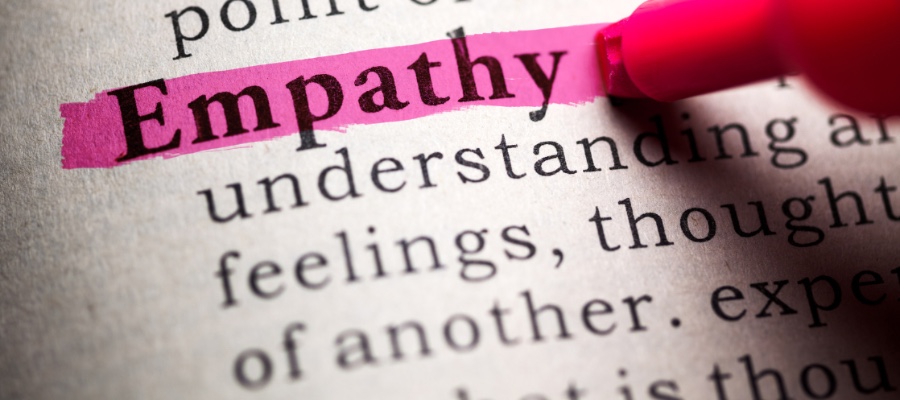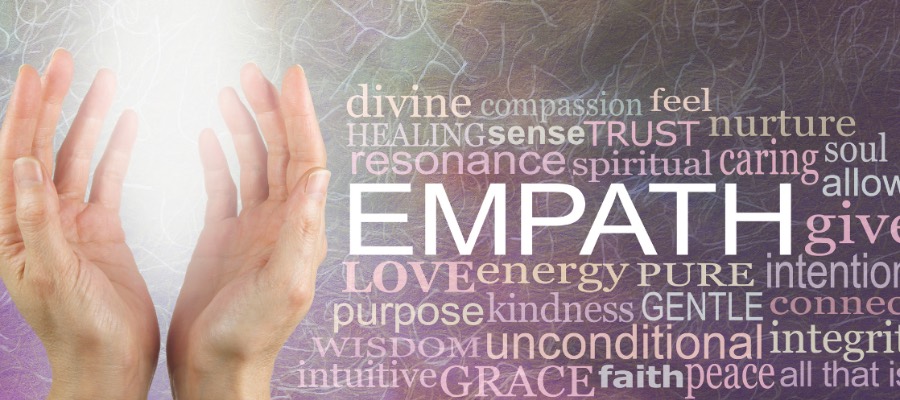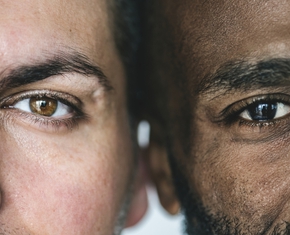The views expressed in our content reflect individual perspectives and do not represent the authoritative views of the Baha'i Faith.
Do you feel the emotions of the characters you watch on television? Can time with high-strung people leave you feeling agitated and overwhelmed? Do you absorb the feelings of those around you and need time alone to heal and restore?
If you answered yes to these questions, then you may be an empath.
What Is an Empath?

As psychiatrist Dr. Nereida Gonzalez-Berrios said in an interview with Well+Good, “A true empath is a person who is sensitive and highly aware of the feelings of others around them to a point of taking the pain and agonies of others as their own.”
According to Stony Brook University psychologists Dr. Arthur Aron and Dr. Elaine Aron, 20 percent of the population is genetically predisposed to empathy. In a 2014 study published in “Brain and Behavior,” Stony Brook University News reported that “Drs. Aron and colleagues at the University of California, Albert Einstein College of Medicine, and Monmouth University found that Functional Magnetic Resonance Imaging (fMRI) of brains provide physical evidence that the ‘highly sensitive’ brain responds powerfully to emotional images.”
People who have high sensory processing sensitivity “process information more thoroughly” and are more aware of and responsive to environmental and social stimuli. Of course, you can be sensitive and empathetic without being an empath. The main difference is that empaths can also energetically internalize someone else’s state of being.
What Are the Different Types of Empaths?

In her book, “The Empath’s Survival Guide: Life Strategies for Sensitive People,” psychiatrist Dr. Judith Orloff identified three main types of empaths: physical, emotional, and intuitive. Physical empaths absorb other people’s physical symptoms, emotional empaths feel other people’s emotions, and intuitive empaths have heightened intuition and extraordinary connections to plants, animals, the Earth, and/or souls who have passed away.
Regardless of what type of empath you are, your heightened sensitivity to the emotions and energy of those around you can make you vulnerable to emotional overload and burnout. As a sensitive soul, I have found that the following spiritual survival tips for empaths have helped me maintain my peace and joy as I continue to navigate through and make connections in this world.
Spiritual Survival Tips for Empaths

1. Identify the Source of Your Emotions

It’s important to identify the source of every unpleasant emotion that you will experience and distinguish your mood from other’s. If you notice that your symptoms or feelings suddenly change after being around a certain person, you may be internalizing their emotions. The Baha’i writings say:
…for as diseases in the world of bodies are extremely contagious, so, in the same way, qualities of spirit and heart are extremely contagious.
Since feelings are contagious, it’s important to only spend time with high-strung people if you are feeling emotionally strong yourself. It’s okay to set boundaries and only go out if you are in a healthy state of mind. It’s easier to help people heal if you are already healed yourself.
2. Avoid Television Dramas and Horror Films

I don’t watch sad or scary movies and television shows because they leave me feeling haunted and gloomy for days afterward. The emotional rollercoaster that dramas and horror films put people through will never be fun for me like it is for many people.
So, if you are an empath, I encourage you to avoid this type of entertainment. There are enough news stories to make us sad without adding the pain of fictional characters along with it. When I am looking for something to watch, I often recall the following quote from the Baha’i writings:
Let your eye be chaste, your hand faithful, your tongue truthful, and your heart enlightened.
Only watching innocent, uplifting, inspiring, or enlightening films will enhance both your emotional and spiritual well-being.
As the King James Bible says, “Finally, brethren, whatsoever things are true, whatsoever things are honest, whatsoever things are just, whatsoever things are pure, whatsoever things are lovely, whatsoever things are of good report; if there be any virtue, and if there be any praise, think on these things.”
3. Practice Breathing Exercises

Breathing exercises are great for helping you release the stress and anxiety that you may have caught from other people.
My favorite breathing exercise is to inhale for 10 seconds, drawing air from the base of my spine to the crown of my head, hold my breath for 10 seconds, and then slowly exhale for 10 seconds. It’s helpful to tell yourself that you’re inhaling all the positive emotions and exhaling all the negative emotions. You’ll end up feeling lighter and a lot more peaceful.
4. Pray and Meditate

I love beginning and ending my day in a state of prayer. Baha’is believe that reciting the verses of God is healing for the body and the soul.
Even if you are in public, saying a short prayer in your head can help soothe you. The following prayer that was revealed by Abdu’l-Baha, one of the central figures of the Baha’i Faith, is one of my favorite prayers for protection:
O God, my God! Shield Thy trusted servants from the evils of self and passion, protect them with the watchful eye of Thy loving-kindness from all rancor, hate and envy, shelter them in the impregnable stronghold of Thy care and, safe from the darts of doubtfulness, make them the manifestations of Thy glorious signs, illumine their faces with the effulgent rays shed from the Dayspring of Thy divine unity, gladden their hearts with the verses revealed from Thy holy kingdom, strengthen their loins by Thine all-swaying power that cometh from Thy realm of glory. Thou art the All-Bountiful, the Protector, the Almighty, the Gracious.
After you pray, I suggest visualizing the burden being taken away from you and a bubble of light surrounding and protecting you from all unwanted and negative energy.
5. Exercise Regularly

“Regular exercise is lifesaving for empaths because it physically expels tension and negative energy,” wrote Dr. Judith Orloff in her book. “A sedentary lifestyle causes your energy flow to stagnate, allowing all kinds of toxins to accumulate.”
So, if you are feeling agitated or anxious, you may want to go out for a walk, take a yoga class, or do some dancing to help purify your body and relax your mind. Remember to drink a lot of water!
6. Eat Healthy

If you want to feel emotionally stronger and more energized, eat fresh foods that make you feel alive.
A diet rich in organic fruits, vegetables, seeds, legumes, and nuts that nourishes you with the variety of vitamins, minerals, and healthy fatty acids that you need will make you feel happier and more empowered. The Baha’i writings say:
Between material things and spiritual things there is a connection. The more healthful his body the greater will be the power of the spirit of man…
7. Spend Time in Nature

Go outside, get fresh air and sunlight, and walk barefoot if you can. Connect with the nature around you and allow the energy of the earth beneath you to heal and revive you.
As Abdu’l-Baha said at a talk in Paris in 1911:
How beautiful the weather is today, the sky is clear, the sun shines, and the heart of man is made glad thereby! Such bright and beautiful weather gives new life and strength to man, and if he has been sick, he feels once more in his heart the joyous hope of health renewed.
8. Allow Time for Rest and Relaxation

Empaths need time alone to regroup, unwind, and center themselves after being exposed to a lot of energy and stimulation.
A letter written on behalf of Shoghi Effendi, the Guardian of the Baha’i Faith, explained:
It—the body—is like a horse which carries the personality and spirit, and as such should be well cared for so it can do its work! You should certainly safeguard your nerves, and force yourself to take time, and not only for prayer and meditation, but for real rest and relaxation.
Getting plenty of sleep at night will also help you be more emotionally stable during the day.
9. Let Your Empathy Lead to Compassion

Whether you are connected to a sick person, wounded animal, or dying plant, you may be divinely drawn to someone or something, because you are meant to help alleviate their suffering.
So, let your empathy lead to compassion as you channel your pain into working for a noble cause. This will ultimately be one of the most rewarding uses of your energy and time.
As stated in a letter written on behalf of Shoghi Effendi:
The more we make others happy the greater will be our own happiness and the deeper our sense of having served humanity.
Although being an empath can be challenging, it is also a beautiful gift to be more connected with God’s creations and understand the sensations that another spirit is experiencing. I hope these spiritual survival tips for sensitive souls help all of you not only survive being an empath, but also thrive.
















Comments
Sign in or create an account
Continue with Googleor